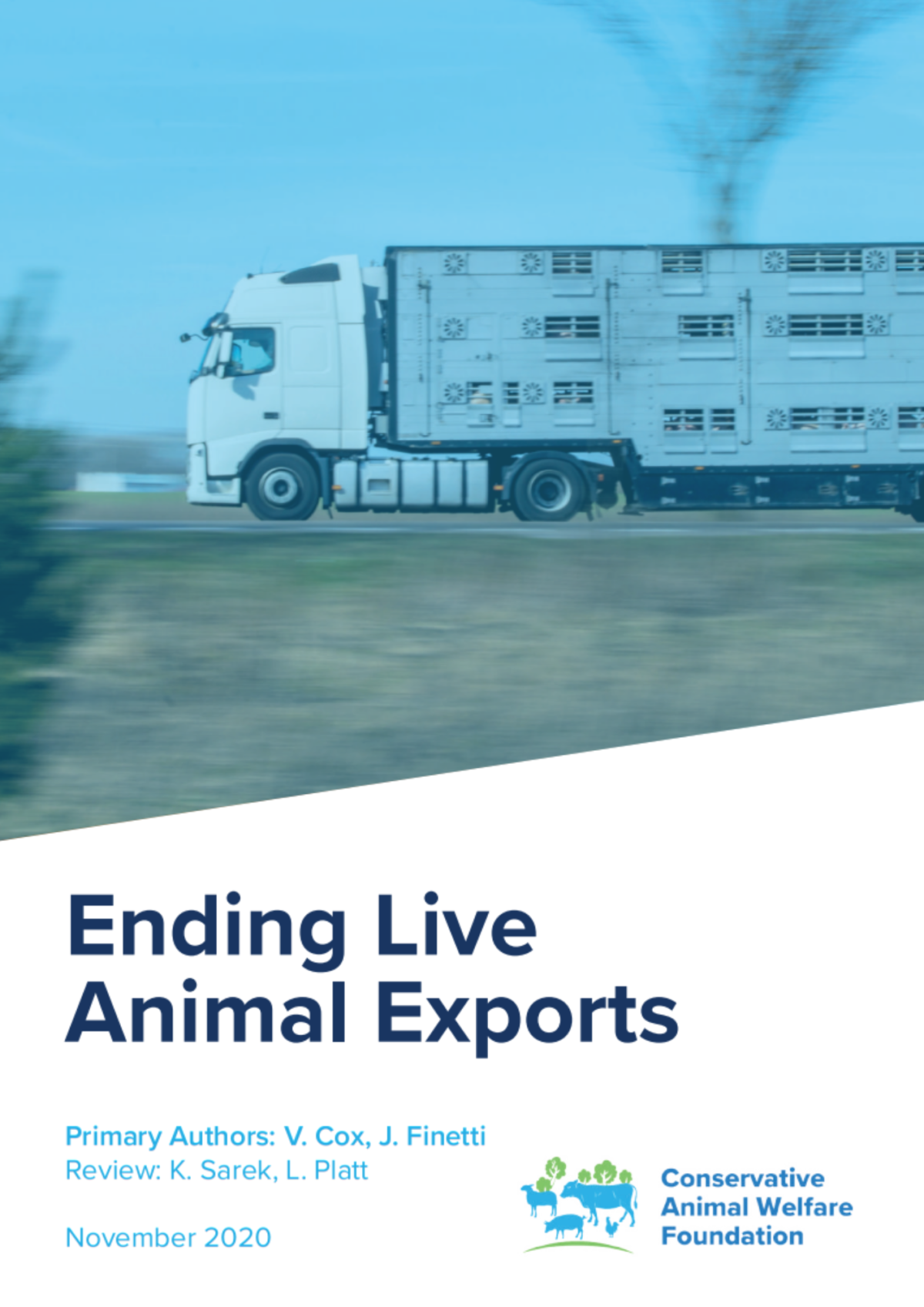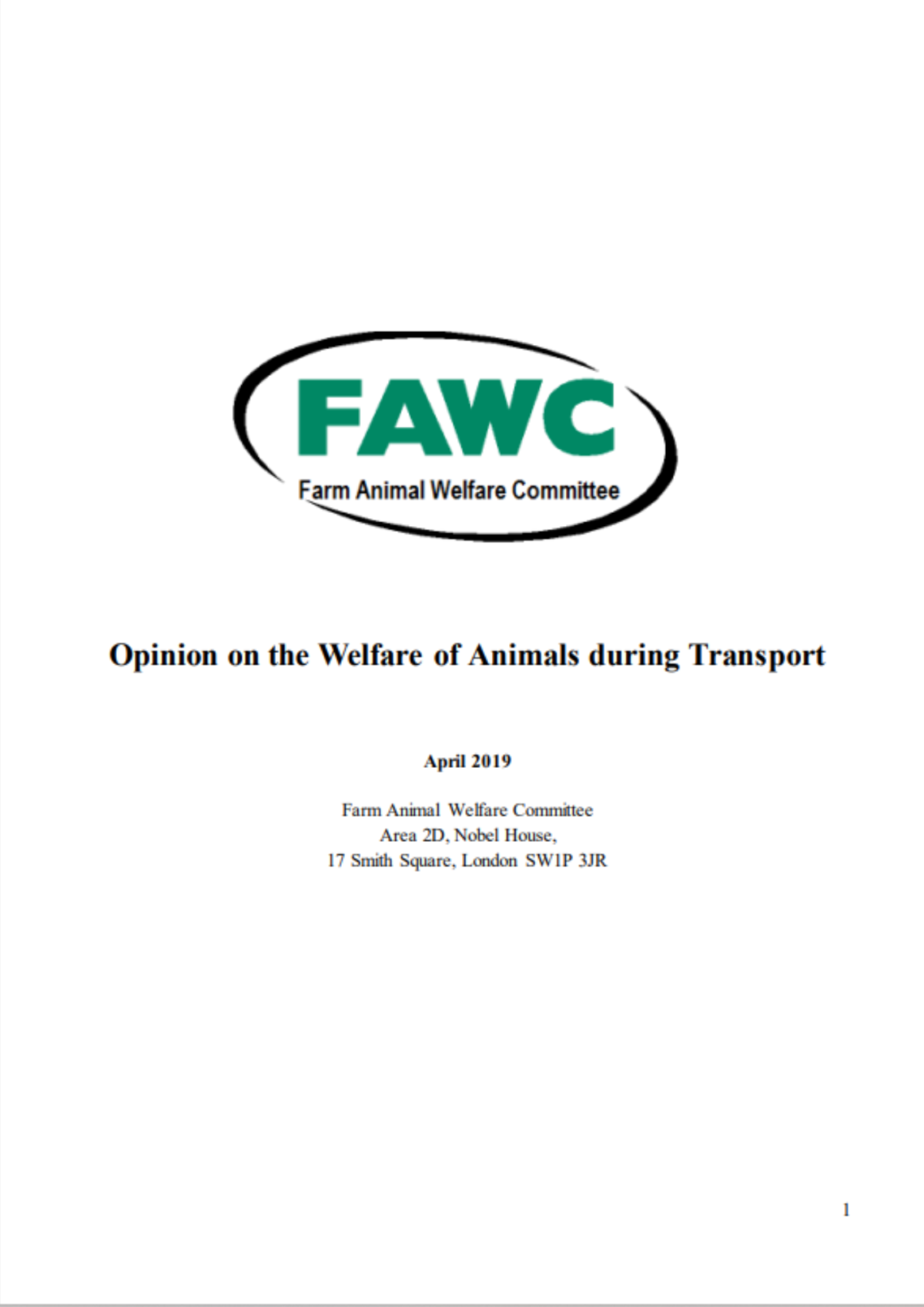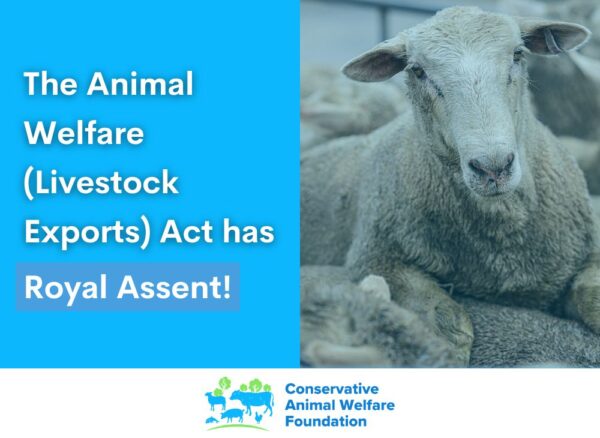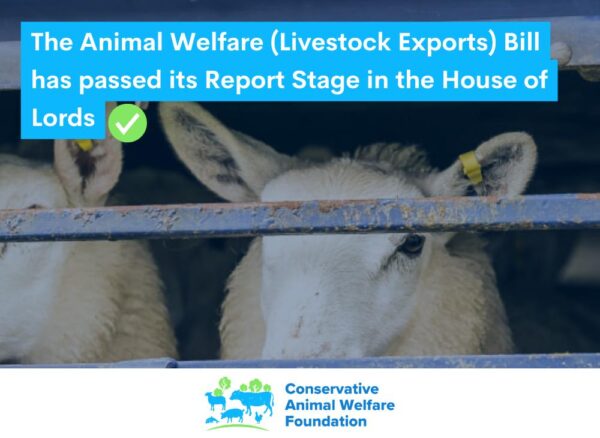We call for the Government to ban the live export trade for slaughter and fattening which, over the years, has caused immense suffering to our animals. It is a 2019 Conservative Manifesto commitment and was included in the Action Plan for Animal Welfare of 2021. When the Kept Animals Bill was dropped in 2023, the Government pledged to deliver this policy through a separate Bill.
In November 2023 the Government announced the Animal Welfare (Livestock Exports) Bill in the King’s Speech, and it had its subsequent First Reading in the House of Commons on 4th December. We believe it is critical this Bill completes all of its stages before the next General Election so that this important Manifesto pledge can be delivered.
Ending live exports is a long-term ambition of successive Prime Ministers. In 2020 Prime Minister Boris Johnson told the House of Commons during Prime Ministers Questions: “We will be able to ban the shipment of live animals which we cannot currently ban in the UK and we will be able to go further and better”.
Current Prime Minister Rishi Sunak has also pledged to deliver an end to live exports. During the Conservative Leadership Contest in 2022 he told Conservative Animal Welfare Foundation Co-Founder Lorraine Platt he would uphold the Kept Animals Bill, which included an end to live exports. You can listen to this below.
Why do we need to end live exports?
Historically, thousands of UK sheep have been exported each year on long journeys to France. Calves are also exported – and travel as far afield as Spain, despite the fact that scientific research shows that young calves suffer greatly during long journeys. Long-distance live animal transports can cause immense suffering.
Overcrowding will mean that some cannot lie down at all, while those who do may be injured or trampled to death. Others endure long journeys with legs trapped and injured, or painfully stooping as they are not given sufficient headroom. They can be in transit for days, suffering extremes of temperature and often without sufficient food, water or rest and can be exhausted and dehydrated. Many die as a result.
Animals are transported in both blistering heat and freezing conditions. Water may not be provided throughout these long journeys. In particular, when animals are exported from Europe to countries outside the EU they leave behind them all the legal protection they once received.
We believe animals should be slaughtered as close as possible to their place of birth and live transports to be replaced by a trade in meat. The meat can be exported in chilled conditions on the hook rather than on the hoof.
We are concerned about serious animal welfare issues related to animals being exported for slaughter or fattening. Defra’s own ‘Call for Evidence” notes from their 2018 consultation state that ‘transport itself can be stressful for animals, for example as a result of loading, unloading and transportation in an unfamiliar environment’. The same Notes, No19, further reports:
‘There is evidence to show transport can compromise animal welfare in a number of ways, though, for example, extreme temperature ranges, lack of food and water, insufficient ability to rest, noise and vibration.’
The science clearly shows that as journey time increases welfare decreases yet EU regulations allow animals to endure extremely long journeys which can last days. There is a need for much-improved enforcement, the maximum journey time is too long and stocking densities are too high.
Insufficient Regulations
There are many serious deficiencies in the current regulations. Checks by authorities are too infrequent or not carried out to a high enough standard. Trucks transporting livestock have been found to regularly breach EU legislation on driving hours putting the driver, animals, and other road users at risk. Livestock trucks are not always inspected in-country for their suitability to carry specific species and this has resulted in cases where animals suffer painful injuries. The current enforcement system is severely limited by a lack of coordination between regulatory bodies of different countries.
Eyes on Animals has exposed violations of the regulations. Breaches that should have been identified at point of inspection by the OV/inspector at point of loading or/and at the portal inspection.
Violations include: Animals unfit to travel, animals not prepared for the journey intended, overcrowding, animals down, excessive temperatures and humidity levels, lack of bedding, lack of water facilities, unauthorised trailers, trailers not fit for purpose, journey times excessively exceeding the times approved, feeding intervals not taking place within the legal time limits and sheep shorn in excessively cold winter conditions.
Animals drink from troughs and buckets when in fields etc. so many do not understand how to use the water nipple systems on trucks. Stocking density and dominant animals prevent all animals accessing any type of water system. Troughs need checking often as animals will soil in the troughs due to limited space. There are limited places to access and replenish water on journeys.
The floor of the trucks covering becomes inadequate after a few hours of travel, causing issues of disease and unnecessary suffering as animals do not want to lie in the waste. The more animals onboard the more waste. Minimal amounts of floor covering are used for slaughter animals. Suitable bedding should be provided. Animals arrive covered in their waste.
Many sheep are being loaded in the North, enduring long journeys before they even approach Ramsgate Port and are being sent for non-stun slaughter in mainland Europe.
Calves should not be exported for fattening in veal crate systems on the continent which are banned in the UK. Calves placed into the Dutch white veal pen systems, where they are unable to perform natural behaviour, are kept in pens where they are barely able to turn around and are not given any straw bedding. The Times newspaper recently reported on two-week calves from Scotland enduring 135-hour journeys.
There is also evidence that calves exported to Spain for beef production are then being re-exported to Third counties such as Lebanon and Turkey where non-stun slaughter is the norm. Again, once UK animals leave our shores, we have no control as to where they end up under current EU regulations.
Pigs should not be exported to systems where sow stalls exist, which are banned in the UK. The UK is unable to safeguard the welfare during transport and slaughter of exported animals once they leave the UK.
Animals may be re-exported from their initial destination. In the 1990s the UK exported large numbers of sheep to the continent. Many were sent to the Netherlands. However, within a day or two of their arrival many were re-exported to Greece, Spain and Italy.
Similar problems could arise in future where UK animals are exported to one EU Member State and then are re-exported to another that has lower standards regarding enforcement of EU legislation on animal welfare during transport and slaughter. Under Regulation 1/2005 a new journey may start just 48 hours after arrival at the initial destination. There is a possibility that animals exported from the UK to an EU Member State could be re-exported to the Middle East, North Africa or Turkey. The EU exports around three million cattle and sheep a year to these destinations.
Alternatives to Live Exports
There are economically viable alternatives to live exports. Sheep should be slaughtered in the UK with exports being in the form of meat. Calves exported from the UK are mainly male dairy calves. Traditionally these were thought to produce poor quality meat which is why they were exported. However, in recent years farmers have been successful in rearing more of these calves for beef here in the UK. No calves should be exported, nor should they be shot at birth; they should be reared in the UK to high welfare conditions. In light of the small proportion of the UK sheep flock and calf herd that is exported for slaughter or fattening, it is hard to believe that live exports play any real role in achieving buoyancy for prices or that an end to exports for slaughter or fattening would have a significant impact on farmers’ incomes.
Ban on Exports and Fattening
A ban on live exports should include both exports for slaughter and fattening. There are two reasons why the ban should extend to exports for fattening.
Calf exports-A ban on exports for slaughter only, would allow calf exports to continue as calves are being exported for fattening; they will be fattened for several months for veal or beef.
Sheep exports CIWF has been monitoring the live export trade for over forty years. Sheep (other than those exported for breeding) are nearly always being exported for slaughter. They will be slaughtered on or within a day or two of arrival.
The reason for a slight delay in slaughter may be because the abattoir has a large number of sheep awaiting slaughter or to allow the animals to regain the weight lost during transport. Sheep are sometimes exported with production (fattening) health certificates as sometimes sheep will not be slaughtered immediately on arrival but only after a delay of a day or two. A ban on exports for slaughter alone would not apply to these sheep. Moreover, some exporters may be tempted to switch to using fattening health certificates to avoid the ban on slaughter exports.
Action Undertaken by the Conservative Animal Welfare Foundation
Ending live exports is a core Conservative Animal Welfare Foundation campaign. We have organised several receptions and events on this issue since our Founding, and take part in the annual International global awareness day to end live transports with our MP Patrons.
In 2017 we organised a parliamentary reception with Conservative Environment Network to end live exports for slaughter and fattening. The event was hosted by Sir Roger Gale MP and then Secretary of State Michael Gove who delivered an excellent speech on ending the misery and suffering in live exports.
The following year we organised a further parliamentary reception to end live exports with Stop Live Exports Petition Team and CIWF in January 2018 hosted by Craig Mackinlay MP. The reception was well attended by over 50 MPs. Later that year in May 2018 the late Conservative Animal Welfare Foundation Patron Sir David Amess MP spoke on ending live exports at the Esher and Walton Conservative Women’s Organisation lunch event on animal welfare which featured an introduction by our Founder.
At Conservative Party Conference in 2018 we hosted a fringe event with the Conservative Environment Network, hosted by Zac Goldsmith with a strong focus to end live exports for slaughter and fattening. Speakers included Theresa Villiers and George Eustice.
In 2019 Sir David Amess MP hosted a fringe event at the Party Conference and our Speakers included then Foreign Secretary Dominic Raab, Carrie Symonds and Stanley Johnson. Our subsequent Party Conference receptions in 2021 and 2022 have strongly urged an end to live exports.
This year, we have organised two important receptions to reiterate the important message that the live export trade for fattening and slaughter has no place in 21st century Britain. In October we held our World Farm Animal Day Reception at Conservative Party Conference in Manchester hosted by our fantastic Patron Anna Firth MP which focussed on ending live exports. We were delighted to hear from Defra Minister Rebecca Pow MP, our Patron Theresa Villiers MP, Kevin Foster MP, Deputy Leader of the Scottish Conservatives Meghan Gallacher MSP, and Jane Stevenson MP.
A couple of weeks later, we held a joint parliamentary reception with CIWF, RSPCA and HSIUK which called for the measures of the Kept Animals Bill – including an end to live exports for fattening and slaughter – to be delivered as soon as possible. We welcomed many MPs across parties, including Leader of the House of Commons Penny Mordaunt MP.

Years ago, the UK ended veal crates and sow stalls which were once thought acceptable. Now the time is long overdue to end the unnecessary suffering caused by live exports for slaughter and fattening. We do not oppose a ban on genuine cross-border trade from Northern Ireland to the Republic of Ireland.
We urge for an end to live exports as soon as possible.








